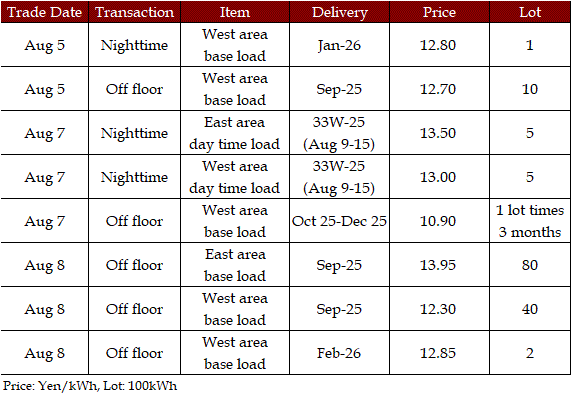Power: Aug 4-8: Spot prices extend gains on historically scorching weather
|
In the day-ahead market on JEPX (Japan Electric Power Exchange), the 24-hour spot power prices on a weekly average basis for Aug 4-7 delivery extended rises from the previous week in East Japan (50Hz) as well as in West Japan (60Hz). In early August, a spell of scorching weather nationwide raised prices further. In the week, 14 spots across the nation reached over 40 degrees Celsius, especially in the Kanto area, where Isesaki City in Gumma Prefecture renewed a country high of hot temperature at 41.8 degrees. Reflecting the temperatures, the aggregated power demand across the country, not including Okinawa, on Aug 5 reached over 3 billion kWh for the first time since February this year. With the inclement hot weather forecast, spot power prices traded on Aug 4 for delivery on Aug 5 recorded a daily high of Yen 40.01 in six areas from Hokkaido to Kansai; for the Tokyo area, the mean price of 24 hours was Yen 19.01. In the market, however, "In contrast to a historical hot temperature, prices did not rise very much" was heard from many sources. For the auction this week, while the number of bids outnumbered the number of offers, that of offers neither went below 1,200 kWh nor showed discrepancy from that of bids. This was because of a stable supply with no huge troubles at thermal power plants. "Buyers also secured their sources through private negotiations, which prevented prices from surging amid scorching weather," a source at a power producer and supplier said.
In Tokyo and Kansai, the key areas in East Japan and West Japan, the 24-hour average posted a difference in favor of the West by Yen 1.00 for Aug 4, by Yen 1.02 for Aug 5, by Yen 1.11 for Aug 6, by Yen 0.44 for Aug 7, and by Yen 0.40 for Aug 8.
The fuel market trends in the second week of August were detailed as follows.
DES Northeast Asia spot LNG prices retreated to high-$11's per mmBtu for prompt September 2025 delivery as of Aug 7, down about $0.3 from the end of the previous week (Aug 1). The softened natural gas markets in Europe as well as a possible negative effect on the economy from tariff conflicts between the US and India lowered the market. The Ministry of Economy, Trade and Industry (METI) announced on Aug 6 that Japan's LNG inventories for power generation stood at 1.92 mil mt as of Aug 3, up 130,000 mt from a week before. The figure was below 1.94 mil mt at the end of July last year and the average of the past five years at 2.15 mil mt.
FOB Newcastle thermal coal prices in Australia fell by over $1.00 from the end of the previous week to high $113's for August 2025 loading as of Aug 7. Prices followed weak gas prices.
In the crude oil market, WTI crude for September 2025 stood at high $63's per barrel as of the morning of August 8, while Brent crude for October 2025 was trading in the mid-$66's. Prices went down by around $3.50 from the end of the previous week for WTI and for Brent. The eight OPEC Plus countries led by Saudi Arabia decided to increase production further by 547,000 barrels per day in September, deriving a perception of oversupply in the market. Moreover, talks for a truce for the Ukraine War between the US and Russia eased a geopolitical risk in the market.
The actual highest price during the week was at Yen 40.01 in six areas from Hokkaido to Kansai on Aug 5; the actual lowest price during the week was at Yen 0.01 in Shikoku area on Aug 4.
By area, the weekly average of the 24-hour spot prices was at Yen 15.62 in Hokkaido, down Yen 0.18 from the previous week; Yen 15.44 in Tohoku, up Yen 1.73; Yen 16.34 in Tokyo, up Yen 1.64; Yen 15.97 in Chubu, up Yen 0.31; Yen 15.54 in Hokuriku and Kansai, up Yen 0.35; Yen 13.36 in Chugoku, up Yen 1.62; Yen 9.50 in Shikoku, up Yen 1.46; and Yen 13.29 in Kyushu, up Yen 1.62.
In the JEPX auction, the volume of offers was 1,244.73 mil kWh on a weekly average basis, down 7.2% from the previous week. Meanwhile, bids on a weekly average basis increased by 5.5% to 1,253.63 mil kWh. The weekly average of trade volumes recorded 929.00 mil kWh, up 0.4%. Compared with the increase in bids, the trade volumes did not grow much, mainly due to high prices keeping bids from transactions.
Power demand in nine areas of Japan during Aug 4-8 was a combined 14,600.26 mil kWh, up 1.3% from 14,412.23 mil kWh during Jul 28-Aug 1. The figure was down 0.9% from the corresponding period a year earlier, which was 14,736.76 mil kWh during Aug 5-9, 2024 after day of week adjustment.
Deals reported on TOCOM (Tokyo Commodity Exchange) during Aug 4-8 were as below.
Deals reported on EEX (European Energy Exchange) during Aug 4-8 were as below.
For the third week in August, power spot prices were expected to fall further from the second week. Major auto manufacturers would halt operation of their plants from Aug 9 to 17 due to the Obon holiday, which would reduce demand from industrial sectors, and then prices. In the market, "In the third week in August, prices for base load in the Tokyo area will hover at Yen 12's or 13's, down from the second week. In Kansai, prices will trade Yen 1.00 lower than those in Tokyo," was heard from a power producer and supplier.
|
||||||||||||||||||||||||||||||











